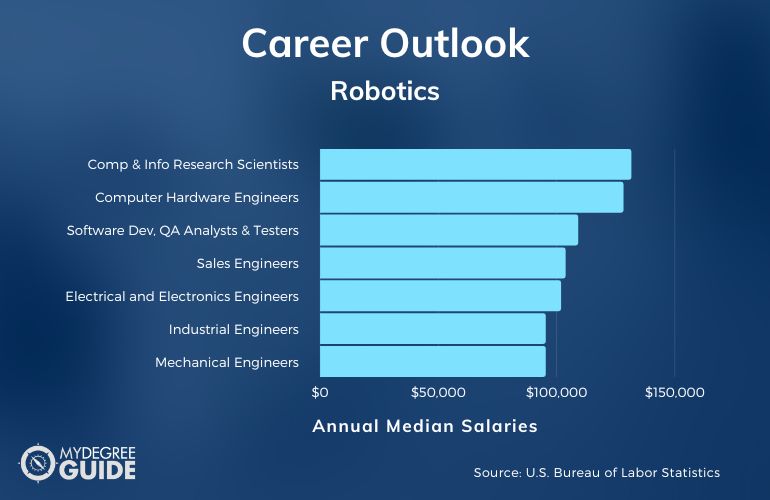Often, when we think of robotics, we think of audio-animatronic figures from films and movies, but earning a masters in robotics is far more than developing human-like helpers.

Understanding the mathematics, computer science, engineering, and mechanics of robotics is a large part of our global technological advancement. A robotics MS can have practical applications in a variety of fields, including healthcare, supply chain management, manufacturing, entertainment, and emergency response.
Editorial Listing ShortCode:
Let’s take a look at some of the options available for those who are considering a masters degree in robotics.
Online Masters in Robotics Programs

An online masters degree in robotics can be an exciting opportunity for those who are interested in the growth and development of technology.
Editorial Listing ShortCode:
In a masters in robotics program, you can study a combination of topics specifically designed to guide you through the process of designing, programming, and operating robots and intelligent autonomous systems.
Students who are interested in a robotics MS often:
- Have a bachelor’s in a related field, such as computer science, engineering, or math
- Enjoy learning computer programming languages
- Know how to analyze, organize, and mine data
- Have a passion for finding new and innovative solutions
- Have the ability to connect with team members and leadership to manage projects
The masters program you choose can help you refine these skills and help you develop specialized skills that are important in a multitude of roles.
Robots, artificial intelligence, and automated mechanical systems are used in more and more industries each day. They can range from surgical tools and automobile manufacturing machinery to interactive features at the bank and grocery store.
As a result, much like with a masters in electronics online, individuals who have earned their masters in robotics can be found in nearly every industry. And, as technology continues to expand, the skills these professionals possess may be in greater demand than ever.
Common Robotics Master’s Specializations

Robotics is a multi-faceted discipline. Many degree programs offer specializations to help students focus on a certain area of robotics.
While each school will offer its own selection of specializations, some popular options include:
- Mechatronics. This specialization combines the study of computer, electrical, and mechanical engineering to design and build complex automated systems.
- Robotics and Autonomous Systems. In order to design automated robotic systems, students in this program will examine how robots interact with their surroundings and each other.
- Perception, Manipulation, and Cognition. This program focuses on developing robots that can perceive and interpret data as they perform tasks, allowing them to respond to changes in their process or scenario.
- Human and Robot Teaming. Students of this specialization work to understand how automation can benefit humans as well as how humans and robots can work together to accomplish a greater range of precise tasks.
- General Robotics. Students may also use this opportunity to explore topics such as ethics, policy, programming, or artificial intelligence in detail.
A degree specialization could help guide you toward your professional goals.
Robotics Careers & Salaries

Those who earn masters degrees in robotics may be identified by a variety of job titles. Due to the many different uses of robotic technology and the many skills involved, not all professionals are identified as robotics engineers.
According to the Bureau of Labor Statistics, here are the median salaries of positions associated with robotics and related fields.
| Careers | Annual Median Salaries |
| Computer and Information Research Scientists | $131,490 |
| Computer Hardware Engineers | $128,170 |
| Software Developers, Quality Assurance Analysts, and Testers | $109,020 |
| Sales Engineers | $103,710 |
| Electrical and Electronics Engineers | $101,780 |
| Industrial Engineers | $95,300 |
| Mechanical Engineers | $95,300 |
| Computer Programmers | $93,000 |
| Industrial Designers | $77,030 |
| Electro-Mechanical and Mechatronics Technologists and Technicians | $60,360 |
Some robotics professionals work in the research field, working to create better programming, hardware, and software for automatic mechanisms. Others work as engineers, designing and building these systems. Some test and analyze the performance of robots.
Editorial Listing ShortCode:
The roles and potential career paths for individuals who earn a masters in robotics can be varied. For instance, your job qualifications could depend on your particular specialization as well as your prior education and experience.
MS in Robotics Curriculum & Courses

Students who pursue their robotics MS degree will take a variety of courses that reflect the many skills incorporated in the field.
While each school will offer its own unique curriculum and courses, these are some of the types of courses you may take:
- Mathematics for Engineers: This course focuses on mathematical processes that are helpful for mechanical, computer, and electrical engineers, such as linear algebra and calculus.
- Introduction to Artificial Intelligence: In this course, you’ll learn about the different types of AI and how to develop reasoning, response, and pattern recognition in each.
- Robot Kinematics: Robotic engineering includes understanding how robots move as well as the force and physics of motion.
- Machine Learning: Big data and machine learning go hand in hand, and this course will cover skills in modeling, algorithms, and performance strategy.
- Ethics and Autonomous Machines: This course reviews the interaction between humans and robots from an ethical and social perspective.
- Principles of Human and Robot Interaction: This course explores how robots and humans can operate together, covering topics like neural signal processing and motion tracking.
- Brain-Computer Engineering: Neural interfacing is a somewhat new field, so this course provides you with an understanding of brain activity communication and robots.
- Pattern Recognition for AI: Students will learn how machines “learn,” including the development of algorithms and systems.
- Cybersecurity and Machine Networks: In this course, you’ll explore how the programming, software, and onboard components may be at risk.
- Digital Control: This course helps you explore control systems and control system designs based on microprocessors and analog technology.
You will likely have courses that focus on your specialization as well.
Admissions Requirements

Each school will have its own admissions requirements, so it’s beneficial to review the application process carefully.
In many cases, schools that offer a masters in robotics program will ask prospective students to provide the following:
- Bachelors degree, often in a related field
- All previous educational transcripts
- Letters of recommendation
- Statement of intent
- GRE or GMAT scores (only some schools require them)
Some programs ask students to complete an interview with the program faculty or to demonstrate aptitude in robotics or engineering. Some programs have prerequisites in math and computer science as well.
Accreditation

As you are exploring options for graduate-level robotics programs, you may wish to pay particular attention to programs from schools that are regionally accredited.
Schools that have received regional accreditation have been evaluated for a higher level of academic and educational aptitude. As a result, some employers and professional organizations give preference to candidates who have received their degree from regionally accredited schools. Additionally, some financial assistance opportunities require students to attend an accredited school.
Editorial Listing ShortCode:
You can visit the Council for Higher Education Accreditation (CHEA) to learn more about regional accreditation and to view a database of accredited schools.
Financial Aid and Scholarships

Students who are exploring need-based financial assistance often start by completing the FAFSA, or Free Application for Federal Student Aid. Student loans are a common form of government aid.
You can also research scholarship and grant opportunities offered by the school you wish to attend. Some learning institutions provide specific financial awards for students in a particular program or field, such as STEM fields. A variety of scholarships may be available from outside organizations and independent donors as well.
If you’re working, you could connect with your employer to determine if tuition reimbursement or educational assistance is available.
What Is a Robotics Engineering Masters Degree?

A robotics engineering masters degree is an advanced degree that combines a number of fields to help design, develop, create, program, and analyze intelligent automated mechanisms and systems.
This program includes the study of computer science, engineering, mathematics, and analytics. Professionals who have their masters degrees may choose to work in a variety of settings, including healthcare, entertainment, business, government, and industrial fields.
Robotics engineers help develop the technology and science that assist in building machines that can enable us to be more productive, efficient, and precise.
What Can You Do with an Online Masters in Robotics?

Due to the many skills learned in an MS program in robotics, graduates may choose from a variety of career opportunities.
Common roles in this field include engineering positions dealing with robotics, machine learning, design, software, hardware, and automation. Some professionals choose to focus on the hardware and mechanics of robots and automated machinery, ensuring that the robot performs its tasks appropriately.
You may also choose to analyze and develop artificial intelligence and AI learning strategies. Others work with software, programming, and application development to support these machines.
How Long Does It Take to Get a Masters Degree in Robotics Engineering Online?

As with other engineering degree online programs, the length of time it takes to get your masters degree in robotics engineering online depends on the structure of your program and your enrollment status.
Editorial Listing ShortCode:
Programs that require 36 credit hours but no thesis may be completed in 1 year, as long as you are enrolled full-time all year round, including during the summer term. Students who are required to complete a thesis or capstone project may take longer to complete their degree program. Part-time enrollment will also take longer.
What’s the Difference Between Mechatronics vs. Robotics Masters Programs?
Some schools include mechatronics and robotics under the same general umbrella of engineering and computer-related degree programs. But these programs can be different as well.
| Mechatronics Masters Program | Robotics Masters Program |
|
|
Overall, robotics is considered to be a sub-set of mechatronics, so the two areas share much common ground.
Is a Masters in Robotics Worth It?

Yes, a masters in robotics is worth it for many students. The many skills learned in a robotics program can prepare students for a variety of career paths, too.
Many professionals who work in electrical, mechanical, or computer engineering are experiencing an increase in employment growth. Overall, the Bureau of Labor Statistics projects steady job growth of 4% for architecture and engineering occupations over the next ten years.
Editorial Listing ShortCode:
Every stage of design, development, programming, testing, and analysis of a robot or automated mechanical process is different. So, professionals who specialize in each area are among those who help support and advance this technology.
Universities Offering Online Masters in Robotics Engineering Degree Programs
Methodology: The following school list is in alphabetical order. To be included, a college or university must be regionally accredited and offer degree programs online or in a hybrid format.

Brandeis University offers an MS in Robotic Software Engineering. The curriculum covers how to code end-to-end and provides opportunities to gain hands-on experience performing industry-relevant skills. The program is available in a fully online, part-time format. It requires the completion of 30 credits, including eight required courses and two electives.
Brandeis University is accredited by the New England Commission of Higher Education.

Georgia Institute of Technology offers an online program for a Master of Science in Computer Science with a specialization in Computational Perception and Robotics. The program requires the completion of 30 credit hours. Potential courses include Computational Science and Engineering Algorithms, Artificial Intelligence, Computational Photography, and Autonomous Robotics.
Georgia Institute of Technology is accredited by the Southern Association of Colleges and Schools Commission on Colleges.

John Hopkins University offers a Master’s in Robotics and Autonomous Systems that can be earned entirely online. The curriculum offers several possible focus areas, including General Robotics, Autonomous Systems, and Human-Robot and Robot-Robot Teaming. The program provides one-on-one mentorship from faculty members who work as practicing scientists.
Johns Hopkins University is accredited by the Middle States Commission on Higher Education.

Kennesaw State University offers a Master of Science in Intelligent Robotic Systems. This online program requires the completion of 30 credit hours. There are start dates offered in the fall, spring, and summer, and the program can typically be finished in 1 year. Co-ops and internship opportunities are available. Graduates can pursue a variety of technological careers.
Kennesaw State University is accredited by the Southern Association of Colleges and Schools Commission on Colleges.

Oklahoma State University offers an MS in Engineering Technology in Mechatronics and Robotics. The curriculum focuses on real-world applications and hands-on learning. The program offers thesis and non-thesis tracks, and both options require the completion of 30 credit hours. Applications are accepted on a rolling basis.
Oklahoma State University is accredited by the Higher Learning Commission.

Stevens Institute of Technology offers a Master of Engineering in Robotics that can be completed on campus and online. The curriculum provides opportunities to try solving complex engineering problems and to participate in hands-on lab projects. The program is designed to be highly flexible and can potentially be finished in just 1 year.
Stevens Institute of Technology is accredited by the Middle States Commission on Higher Education.

The University of Cincinnati offers a Master of Engineering in Robotics and Intelligent Autonomous Systems. The degree can be earned 100% online and potentially completed in just 18 months. All courses are taught by instructors with real-world industry experience. The program requires the completion of 30 credits.
The University of Cincinnati is accredited by the Higher Learning Commission.

The University of Michigan—Dearborn offers an MSE in Robotics Engineering. This 30 credit program is available in online, on-campus, and hybrid formats. There are late afternoon and evening scheduling options available for on-campus classes to help accommodate part-time working students.
The University of Michigan – Dearborn is accredited by the Higher Learning Commission.

Widener University offers a flexible Master’s in Robotics Engineering program that is designed for working professionals. Classes are available in the evenings and for online streaming. The program requires the completion of 30 credits, which can typically be finished in 2 years. Mentorship from professors and personalized research opportunities are available.
Widener University is accredited by the Middle States Association of Colleges and Schools.

Worcester Polytechnic Institute offers a Master of Science in Robotics Engineering that can be earned online or on campus. This may be completed with an optional specialization in Autonomous Vehicles. The curriculum focuses on solving real-world problems. The program culminates with a capstone project in which students must apply what they have learned.
WPI is accredited by the New England Commission of Higher Education.
Getting Your Masters in Robotics Engineering Online

If you are fascinated by artificial intelligence, automated mechanical processes, robots, and the possibilities of technological development, you may consider earning your online masters in robotics engineering degree.
Professionals who can help develop, maintain, and revolutionize in the field of robotic engineering are needed in a variety of industries and roles. You can take a look at some of the available online programs offered by accredited schools to determine if the courses and specializations align with your interests.
Comparing your options could help ensure that you find the program that’s best suited to helping you achieve your personal and professional goals.

